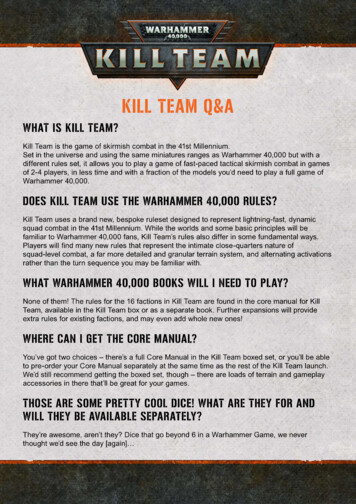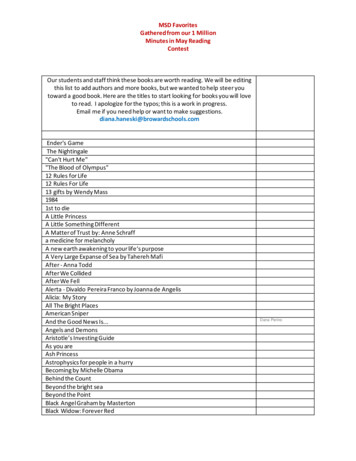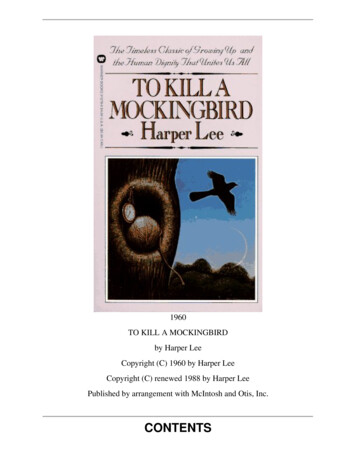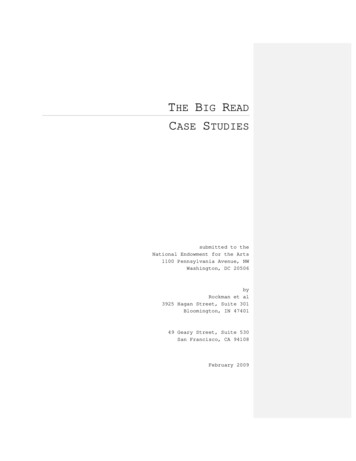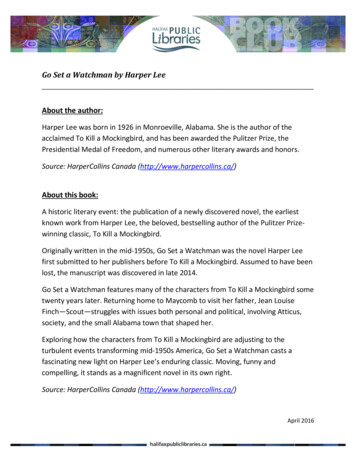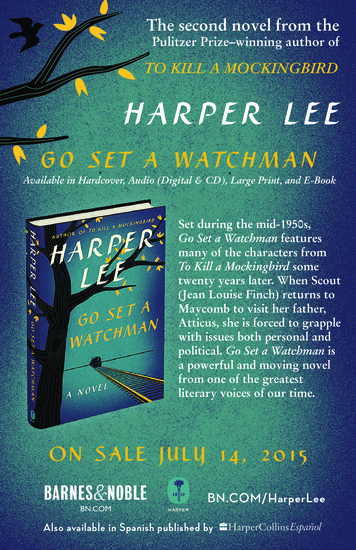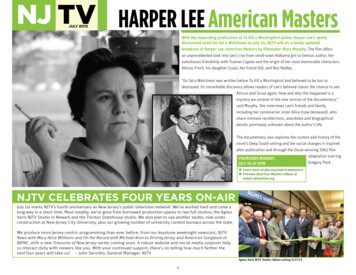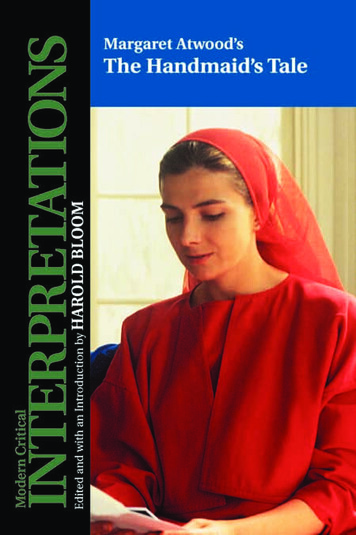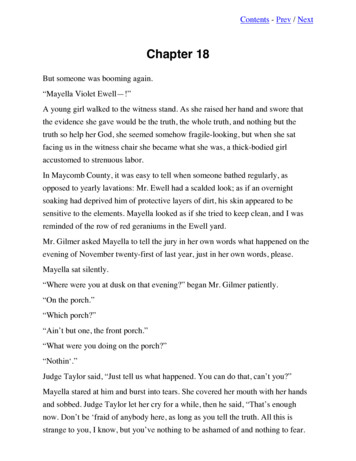
Transcription
Contents - Prev / NextChapter 18But someone was booming again.“Mayella Violet Ewell—!”A young girl walked to the witness stand. As she raised her hand and swore thatthe evidence she gave would be the truth, the whole truth, and nothing but thetruth so help her God, she seemed somehow fragile-looking, but when she satfacing us in the witness chair she became what she was, a thick-bodied girlaccustomed to strenuous labor.In Maycomb County, it was easy to tell when someone bathed regularly, asopposed to yearly lavations: Mr. Ewell had a scalded look; as if an overnightsoaking had deprived him of protective layers of dirt, his skin appeared to besensitive to the elements. Mayella looked as if she tried to keep clean, and I wasreminded of the row of red geraniums in the Ewell yard.Mr. Gilmer asked Mayella to tell the jury in her own words what happened on theevening of November twenty-first of last year, just in her own words, please.Mayella sat silently.“Where were you at dusk on that evening?” began Mr. Gilmer patiently.“On the porch.”“Which porch?”“Ain’t but one, the front porch.”“What were you doing on the porch?”“Nothin‘.”Judge Taylor said, “Just tell us what happened. You can do that, can’t you?”Mayella stared at him and burst into tears. She covered her mouth with her handsand sobbed. Judge Taylor let her cry for a while, then he said, “That’s enoughnow. Don’t be ‘fraid of anybody here, as long as you tell the truth. All this isstrange to you, I know, but you’ve nothing to be ashamed of and nothing to fear.
What are you scared of?”Mayella said something behind her hands. “What was that?” asked the judge.“Him,” she sobbed, pointing at Atticus.“Mr. Finch?”She nodded vigorously, saying, “Don’t want him doin‘ me like he done Papa,tryin’ to make him out lefthanded ”Judge Taylor scratched his thick white hair. It was plain that he had never beenconfronted with a problem of this kind. “How old are you?” he asked.“Nineteen-and-a-half,” Mayella said.Judge Taylor cleared his throat and tried unsuccessfully to speak in soothingtones. “Mr. Finch has no idea of scaring you,” he growled, “and if he did, I’mhere to stop him. That’s one thing I’m sitting up here for. Now you’re a big girl,so you just sit up straight and tell the—tell us what happened to you. You can dothat, can’t you?”I whispered to Jem, “Has she got good sense?”Jem was squinting down at the witness stand. “Can’t tell yet,” he said. “She’s gotenough sense to get the judge sorry for her, but she might be just—oh, I don’tknow.”Mollified, Mayella gave Atticus a final terrified glance and said to Mr. Gilmer,“Well sir, I was on the porch and—and he came along and, you see, there was thisold chiffarobe in the yard Papa’d brought in to chop up for kindlin‘—Papa toldme to do it while he was off in the woods but I wadn’t feelin’ strong enough then,so he came by-”“Who is ‘he’?”Mayella pointed to Tom Robinson. “I’ll have to ask you to be more specific,please,” said Mr. Gilmer. “The reporter can’t put down gestures very well.”“That’n yonder,” she said. “Robinson.”“Then what happened?”“I said come here, nigger, and bust up this chiffarobe for me, I gotta nickel foryou. He coulda done it easy enough, he could. So he come in the yard an‘ I went
in the house to get him the nickel and I turned around an ’fore I knew it he was onme. Just run up behind me, he did. He got me round the neck, cussin‘ me an’sayin‘ dirt—I fought’n’hollered, but he had me round the neck. He hit me aginan‘ agin—”Mr. Gilmer waited for Mayella to collect herself: she had twisted herhandkerchief into a sweaty rope; when she opened it to wipe her face it was amass of creases from her hot hands. She waited for Mr. Gilmer to ask anotherquestion, but when he didn’t, she said, “-he chunked me on the floor an‘ chokedme’n took advantage of me.”“Did you scream?” asked Mr. Gilmer. “Did you scream and fight back?”“Reckon I did, hollered for all I was worth, kicked and hollered loud as I could.”“Then what happened?”“I don’t remember too good, but next thing I knew Papa was in the rooma’standing over me hollerin‘ who done it, who done it? Then I sorta fainted an’the next thing I knew Mr. Tate was pullin‘ me up offa the floor and leadin’ me tothe water bucket.”Apparently Mayella’s recital had given her confidence, but it was not her father’sbrash kind: there was something stealthy about hers, like a steady-eyed cat with atwitchy tail.“You say you fought him off as hard as you could? Fought him tooth and nail?”asked Mr. Gilmer.“I positively did,” Mayella echoed her father.“You are positive that he took full advantage of you?”Mayella’s face contorted, and I was afraid that she would cry again. Instead, shesaid, “He done what he was after.”Mr. Gilmer called attention to the hot day by wiping his head with his hand.“That’s all for the time being,” he said pleasantly, “but you stay there. I expectbig bad Mr. Finch has some questions to ask you.”“State will not prejudice the witness against counsel for the defense,” murmuredJudge Taylor primly, “at least not at this time.”Atticus got up grinning but instead of walking to the witness stand, he opened his
coat and hooked his thumbs in his vest, then he walked slowly across the room tothe windows. He looked out, but didn’t seem especially interested in what he saw,then he turned and strolled back to the witness stand. From long years ofexperience, I could tell he was trying to come to a decision about something.“Miss Mayella,” he said, smiling, “I won’t try to scare you for a while, not yet.Let’s just get acquainted. How old are you?”“Said I was nineteen, said it to the judge yonder.” Mayella jerked her headresentfully at the bench.“So you did, so you did, ma’am. You’ll have to bear with me, Miss Mayella, I’mgetting along and can’t remember as well as I used to. I might ask you thingsyou’ve already said before, but you’ll give me an answer, won’t you? Good.”I could see nothing in Mayella’s expression to justify Atticus’s assumption that hehad secured her wholehearted cooperation. She was looking at him furiously.“Won’t answer a word you say long as you keep on mockin‘ me,” she said.“Ma’am?” asked Atticus, startled.“Long’s you keep on makin‘ fun o’me.”Judge Taylor said, “Mr. Finch is not making fun of you. What’s the matter withyou?”Mayella looked from under lowered eyelids at Atticus, but she said to the judge:“Long’s he keeps on callin‘ me ma’am an sayin’ Miss Mayella. I don’t hafta takehis sass, I ain’t called upon to take it.”Atticus resumed his stroll to the windows and let Judge Taylor handle this one.Judge Taylor was not the kind of figure that ever evoked pity, but I did feel apang for him as he tried to explain. “That’s just Mr. Finch’s way,” he toldMayella. “We’ve done business in this court for years and years, and Mr. Finch isalways courteous to everybody. He’s not trying to mock you, he’s trying to bepolite. That’s just his way.”The judge leaned back. “Atticus, let’s get on with these proceedings, and let therecord show that the witness has not been sassed, her views to the contrary.”I wondered if anybody had ever called her “ma’am,” or “Miss Mayella” in herlife; probably not, as she took offense to routine courtesy. What on earth was her
life like? I soon found out.“You say you’re nineteen,” Atticus resumed. “How many sisters and brothershave you?” He walked from the windows back to the stand.“Seb’m,” she said, and I wondered if they were all like the specimen I had seenthe first day I started to school.“You the eldest? The oldest?”“Yes.”“How long has your mother been dead?”“Don’t know—long time.”“Did you ever go to school?”“Read’n‘write good as Papa yonder.”Mayella sounded like a Mr. Jingle in a book I had been reading.“How long did you go to school?”“Two year—three year—dunno.”Slowly but surely I began to see the pattern of Atticus’s questions: from questionsthat Mr. Gilmer did not deem sufficiently irrelevant or immaterial to object to,Atticus was quietly building up before the jury a picture of the Ewells’ home life.The jury learned the following things: their relief check was far from enough tofeed the family, and there was strong suspicion that Papa drank it up anyway—hesometimes went off in the swamp for days and came home sick; the weather wasseldom cold enough to require shoes, but when it was, you could make dandyones from strips of old tires; the family hauled its water in buckets from a springthat ran out at one end of the dump—they kept the surrounding area clear of trash—and it was everybody for himself as far as keeping clean went: if you wanted towash you hauled your own water; the younger children had perpetual colds andsuffered from chronic ground-itch; there was a lady who came around sometimesand asked Mayella why she didn’t stay in school—she wrote down the answer;with two members of the family reading and writing, there was no need for therest of them to learn—Papa needed them at home.“Miss Mayella,” said Atticus, in spite of himself, “a nineteen-year-old girl like
you must have friends. Who are your friends?”The witness frowned as if puzzled. “Friends?”“Yes, don’t you know anyone near your age, or older, or younger? Boys andgirls? Just ordinary friends?”Mayella’s hostility, which had subsided to grudging neutrality, flared again. “Youmakin‘ fun o’me agin, Mr. Finch?”Atticus let her question answer his.“Do you love your father, Miss Mayella?” was his next.“Love him, whatcha mean?”“I mean, is he good to you, is he easy to get along with?”“He does tollable, ‘cept when—”“Except when?”Mayella looked at her father, who was sitting with his chair tipped against therailing. He sat up straight and waited for her to answer.“Except when nothin‘,” said Mayella. “I said he does tollable.”Mr. Ewell leaned back again.“Except when he’s drinking?” asked Atticus so gently that Mayella nodded.“Does he ever go after you?”“How you mean?”“When he’s—riled, has he ever beaten you?”Mayella looked around, down at the court reporter, up at the judge. “Answer thequestion, Miss Mayella,” said Judge Taylor.“My paw’s never touched a hair o’my head in my life,” she declared firmly. “Henever touched me.”Atticus’s glasses had slipped a little, and he pushed them up on his nose. “We’vehad a good visit, Miss Mayella, and now I guess we’d better get to the case. Yousay you asked Tom Robinson to come chop up a—what was it?”“A chiffarobe, a old dresser full of drawers on one side.”
“Was Tom Robinson well known to you?”“Whaddya mean?”“I mean did you know who he was, where he lived?”Mayella nodded. “I knowed who he was, he passed the house every day.”“Was this the first time you asked him to come inside the fence?”Mayella jumped slightly at the question. Atticus was making his slow pilgrimageto the windows, as he had been doing: he would ask a question, then look out,waiting for an answer. He did not see her involuntary jump, but it seemed to methat he knew she had moved. He turned around and raised his eyebrows. “Was—”he began again.“Yes it was.”“Didn’t you ever ask him to come inside the fence before?”She was prepared now. “I did not, I certainly did not.”“One did not’s enough,” said Atticus serenely. “You never asked him to do oddjobs for you before?”“I mighta,” conceded Mayella. “There was several niggers around.”“Can you remember any other occasions?”“No.”“All right, now to what happened. You said Tom Robinson was behind you in theroom when you turned around, that right?”“Yes.”“You said he ‘got you around the neck cussing and saying dirt’—is that right?”“‘t’s right.”Atticus’s memory had suddenly become accurate. “You say ‘he caught me andchoked me and took advantage of me’—is that right?”“That’s what I said.”“Do you remember him beating you about the face?”The witness hesitated.“You seem sure enough that he choked you. All this time you were fighting back,
remember? You ‘kicked and hollered as loud as you could.’ Do you rememberhim beating you about the face?”Mayella was silent. She seemed to be trying to get something clear to herself. Ithought for a moment she was doing Mr. Heck Tate’s and my trick of pretendingthere was a person in front of us. She glanced at Mr. Gilmer.“It’s an easy question, Miss Mayella, so I’ll try again. Do you remember himbeating you about the face?” Atticus’s voice had lost its comfortableness; he wasspeaking in his arid, detached professional voice. “Do you remember him beatingyou about the face?”“No, I don’t recollect if he hit me. I mean yes I do, he hit me.”“Was your last sentence your answer?”“Huh? Yes, he hit—I just don’t remember, I just don’t remember it allhappened so quick.”Judge Taylor looked sternly at Mayella. “Don’t you cry, young woman—” hebegan, but Atticus said, “Let her cry if she wants to, Judge. We’ve got all the timein the world.”Mayella sniffed wrathfully and looked at Atticus. “I’ll answer any question yougot—get me up here an‘ mock me, will you? I’ll answer any question you got—”“That’s fine,” said Atticus. “There’re only a few more. Miss Mayella, not to betedious, you’ve testified that the defendant hit you, grabbed you around the neck,choked you, and took advantage of you. I want you to be sure you have the rightman. Will you identify the man who raped you?”“I will, that’s him right yonder.”Atticus turned to the defendant. “Tom, stand up. Let Miss Mayella have a goodlong look at you. Is this the man, Miss Mayella?”Tom Robinson’s powerful shoulders rippled under his thin shirt. He rose to hisfeet and stood with his right hand on the back of his chair. He looked oddly offbalance, but it was not from the way he was standing. His left arm was fullytwelve inches shorter than his right, and hung dead at his side. It ended in a smallshriveled hand, and from as far away as the balcony I could see that it was no useto him.
“Scout,” breathed Jem. “Scout, look! Reverend, he’s crippled!”Reverend Sykes leaned across me and whispered to Jem. “He got it caught in acotton gin, caught it in Mr. Dolphus Raymond’s cotton gin when he was a boy like to bled to death tore all the muscles loose from his bones—”Atticus said, “Is this the man who raped you?”“It most certainly is.”Atticus’s next question was one word long. “How?”Mayella was raging. “I don’t know how he done it, but he done it—I said it allhappened so fast I—”“Now let’s consider this calmly—” began Atticus, but Mr. Gilmer interruptedwith an objection: he was not irrelevant or immaterial, but Atticus wasbrowbeating the witness.Judge Taylor laughed outright. “Oh sit down, Horace, he’s doing nothing of thesort. If anything, the witness’s browbeating Atticus.”Judge Taylor was the only person in the courtroom who laughed. Even the babieswere still, and I suddenly wondered if they had been smothered at their mothers’breasts.“Now,” said Atticus, “Miss Mayella, you’ve testified that the defendant chokedand beat you—you didn’t say that he sneaked up behind you and knocked youcold, but you turned around and there he was—” Atticus was back behind histable, and he emphasized his words by tapping his knuckles on it. “—do you wishto reconsider any of your testimony?”“You want me to say something that didn’t happen?”“No ma’am, I want you to say something that did happen. Tell us once more,please, what happened?”“I told’ja what happened.”“You testified that you turned around and there he was. He choked you then?”“Yes.”“Then he released your throat and hit you?”“I said he did.”
“He blacked your left eye with his right fist?”“I ducked and it—it glanced, that’s what it did. I ducked and it glanced off.”Mayella had finally seen the light.“You’re becoming suddenly clear on this point. A while ago you couldn’tremember too well, could you?”“I said he hit me.”“All right. He choked you, he hit you, then he raped you, that right?”“It most certainly is.”“You’re a strong girl, what were you doing all the time, just standing there?”“I told’ja I hollered’n‘kicked’n’fought—”Atticus reached up and took off his glasses, turned his good right eye to thewitness, and rained questions on her. Judge Taylor said, “One question at a time,Atticus. Give the witness a chance to answer.”“All right, why didn’t you run?”“I tried ”“Tried to? What kept you from it?”“I—he slung me down. That’s what he did, he slung me down’n got on top ofme.”“You were screaming all this time?”“I certainly was.”“Then why didn’t the other children hear you? Where were they? At the dump?”“Where were they?”No answer.“Why didn’t your screams make them come running? The dump’s closer than thewoods, isn’t it?”No answer.“Or didn’t you scream until you saw your father in the window? You didn’t thinkto scream until then, did you?”No answer.
“Did you scream first at your father instead of at Tom Robinson? Was that it?”No answer.“Who beat you up? Tom Robinson or your father?”No answer.“What did your father see in the window, the crime of rape or the best defense toit? Why don’t you tell the truth, child, didn’t Bob Ewell beat you up?”When Atticus turned away from Mayella he looked like his stomach hurt, butMayella’s face was a mixture of terror and fury. Atticus sat down wearily andpolished his glasses with his handkerchief.Suddenly Mayella became articulate. “I got somethin‘ to say,” she said.Atticus raised his head. “Do you want to tell us what happened?”But she did not hear the compassion in his invitation. “I got somethin‘ to say an’then I ain’t gonna say no more. That nigger yonder took advantage of me an‘ ifyou fine fancy gentlemen don’t wanta do nothin’ about it then you’re all yellowstinkin‘ cowards, stinkin’ cowards, the lot of you. Your fancy airs don’t come tonothin‘—your ma’amin’ and Miss Mayellerin‘ don’t come to nothin’, Mr. Finch—”Then she burst into real tears. Her shoulders shook with angry sobs. She was asgood as her word. She answered no more questions, even when Mr. Gilmer triedto get her back on the track. I guess if she hadn’t been so poor and ignorant, JudgeTaylor would have put her under the jail for the contempt she had showneverybody in the courtroom. Somehow, Atticus had hit her hard in a way that wasnot clear to me, but it gave him no pleasure to do so. He sat with his head down,and I never saw anybody glare at anyone with the hatred Mayella showed whenshe left the stand and walked by Atticus’s table.When Mr. Gilmer told Judge Taylor that the state rested, Judge Taylor said, “It’stime we all did. We’ll take ten minutes.”Atticus and Mr. Gilmer met in front of the bench and whispered, then they left thecourtroom by a door behind the witness stand, which was a signal for us all tostretch. I discovered that I had been sitting on the edge of the long bench, and Iwas somewhat numb. Jem got up and yawned, Dill did likewise, and Reverend
Sykes wiped his face on his hat. The temperature was an easy ninety, he said.Mr. Braxton Underwood, who had been sitting quietly in a chair reserved for thePress, soaking up testimony with his sponge of a brain, allowed his bitter eyes torove over the colored balcony, and they met mine. He gave a snort and lookedaway.“Jem,” I said, “Mr. Underwood’s seen us.”“That’s okay. He won’t tell Atticus, he’ll just put it on the social side of theTribune.” Jem turned back to Dill, explaining, I suppose, the finer points of thetrial to him, but I wondered what they were. There had been no lengthy debatesbetween Atticus and Mr. Gilmer on any points; Mr. Gilmer seemed to beprosecuting almost reluctantly; witnesses had been led by the nose as asses are,with few objections. But Atticus had once told us that in Judge Taylor’s court anylawyer who was a strict constructionist on evidence usually wound up receivingstrict instructions from the bench. He distilled this for me to mean that JudgeTaylor might look lazy and operate in his sleep, but he was seldom reversed, andthat was the proof of the pudding. Atticus said he was a good judge.Presently Judge Taylor returned and climbed into his swivel chair. He took a cigarfrom his vest pocket and examined it thoughtfully. I punched Dill. Having passedthe judge’s inspection, the cigar suffered a vicious bite. “We come downsometimes to watch him,” I explained. “It’s gonna take him the rest of theafternoon, now. You watch.” Unaware of public scrutiny from above, JudgeTaylor disposed of the severed end by propelling it expertly to his lips and saying,“Fhluck!” He hit a spittoon so squarely we could hear it slosh. “Bet he was hellwith a spitball,” murmured Dill.As a rule, a recess meant a general exodus, but today people weren’t moving.Even the Idlers who had failed to shame younger men from their seats hadremained standing along the walls. I guess Mr. Heck Tate had reserved the countytoilet for court officials.Atticus and Mr. Gilmer returned, and Judge Taylor looked at his watch. “It’sgettin‘ on to four,” he said, which was intriguing, as the courthouse clock musthave struck the hour at least twice. I had not heard it or felt its vibrations.“Shall we try to wind up this afternoon?” asked Judge Taylor. “How ‘bout it,
Atticus?”“I think we can,” said Atticus.“How many witnesses you got?”“One.”“Well, call him.”Contents - Prev / NextChapter 19Thomas Robinson reached around, ran his fingers under his left arm and lifted it.He guided his arm to the Bible and his rubber-like left hand sought contact withthe black binding. As he raised his right hand, the useless one slipped off theBible and hit the clerk’s table. He was trying again when Judge Taylor growled,“That’ll do, Tom.” Tom took the oath and stepped into the witness chair. Atticusvery quickly induced him to tell us:Tom was twenty-five years of age; he was married with three children; he hadbeen in trouble with the law before: he once received thirty days for disorderlyconduct.“It must have been disorderly,” said Atticus. “What did it consist of?”“Got in a fight with another man, he tried to cut me.”“Did he succeed?”“Yes suh, a little, not enough to hurt. You see, I—” Tom moved his left shoulder.“Yes,” said Atticus. “You were both convicted?”“Yes suh, I had to serve ‘cause I couldn’t pay the fine. Other fellow paid his’n.”Dill leaned across me and asked Jem what Atticus was doing. Jem said Atticuswas showing the jury that Tom had nothing to hide.“Were you acquainted with Mayella Violet Ewell?” asked Atticus.
“Yes suh, I had to pass her place goin‘ to and from the field every day.”“Whose field?”“I picks for Mr. Link Deas.”“Were you picking cotton in November?”“No suh, I works in his yard fall an‘ wintertime. I works pretty steady for him allyear round, he’s got a lot of pecan trees’n things.”“You say you had to pass the Ewell place to get to and from work. Is there anyother way to go?”“No suh, none’s I know of.”“Tom, did she ever speak to you?”“Why, yes suh, I’d tip m’hat when I’d go by, and one day she asked me to comeinside the fence and bust up a chiffarobe for her.”“When did she ask you to chop up the—the chiffarobe?”“Mr. Finch, it was way last spring. I remember it because it was choppin‘ timeand I had my hoe with me. I said I didn’t have nothin’ but this hoe, but she saidshe had a hatchet. She give me the hatchet and I broke up the chiffarobe. She said,‘I reckon I’ll hafta give you a nickel, won’t I?’ an‘ I said, ’No ma’am, there ain’tno charge.‘ Then I went home. Mr. Finch, that was way last spring, way over ayear ago.”“Did you ever go on the place again?”“Yes suh.”“When?”“Well, I went lots of times.”Judge Taylor instinctively reached for his gavel, but let his hand fall. The murmurbelow us died without his help.“Under what circumstances?”“Please, suh?”“Why did you go inside the fence lots of times?”Tom Robinson’s forehead relaxed. “She’d call me in, suh. Seemed like every time
I passed by yonder she’d have some little somethin‘ for me to do—choppin’kindlin‘, totin’ water for her. She watered them red flowers every day—”“Were you paid for your services?”“No suh, not after she offered me a nickel the first time. I was glad to do it, Mr.Ewell didn’t seem to help her none, and neither did the chillun, and I knowed shedidn’t have no nickels to spare.”“Where were the other children?”“They was always around, all over the place. They’d watch me work, some of‘em, some of ’em’d set in the window.”“Would Miss Mayella talk to you?”“Yes sir, she talked to me.”As Tom Robinson gave his testimony, it came to me that Mayella Ewell musthave been the loneliest person in the world. She was even lonelier than BooRadley, who had not been out of the house in twenty-five years. When Atticusasked had she any friends, she seemed not to know what he meant, then shethought he was making fun of her. She was as sad, I thought, as what Jem called amixed child: white people wouldn’t have anything to do with her because shelived among pigs; Negroes wouldn’t have anything to do with her because shewas white. She couldn’t live like Mr. Dolphus Raymond, who preferred thecompany of Negroes, because she didn’t own a riverbank and she wasn’t from afine old family. Nobody said, “That’s just their way,” about the Ewells. Maycombgave them Christmas baskets, welfare money, and the back of its hand. TomRobinson was probably the only person who was ever decent to her. But she saidhe took advantage of her, and when she stood up she looked at him as if he weredirt beneath her feet.“Did you ever,” Atticus interrupted my meditations, “at any time, go on the Ewellproperty—did you ever set foot on the Ewell property without an expressinvitation from one of them?”“No suh, Mr. Finch, I never did. I wouldn’t do that, suh.”Atticus sometimes said that one way to tell whether a witness was lying or tellingthe truth was to listen rather than watch: I applied his test—Tom denied it three
times in one breath, but quietly, with no hint of whining in his voice, and I foundmyself believing him in spite of his protesting too much. He seemed to be arespectable Negro, and a respectable Negro would never go up into somebody’syard of his own volition.“Tom, what happened to you on the evening of November twenty-first of lastyear?”Below us, the spectators drew a collective breath and leaned forward. Behind us,the Negroes did the same.Tom was a black-velvet Negro, not shiny, but soft black velvet. The whites of hiseyes shone in his face, and when he spoke we saw flashes of his teeth. If he hadbeen whole, he would have been a fine specimen of a man.“Mr. Finch,” he said, “I was goin‘ home as usual that evenin’, an‘ when I passedthe Ewell place Miss Mayella were on the porch, like she said she were. It seemedreal quiet like, an’ I didn’t quite know why. I was studyin‘ why, just passin’ by,when she says for me to come there and help her a minute. Well, I went inside thefence an‘ looked around for some kindlin’ to work on, but I didn’t see none, andshe says, ‘Naw, I got somethin’ for you to do in the house. Th‘ old door’s off itshinges an’ fall’s comin‘ on pretty fast.’ I said you got a screwdriver, MissMayella? She said she sho‘ had. Well, I went up the steps an’ she motioned me tocome inside, and I went in the front room an‘ looked at the door. I said MissMayella, this door look all right. I pulled it back’n forth and those hinges was allright. Then she shet the door in my face. Mr. Finch, I was wonderin’ why it wasso quiet like, an‘ it come to me that there weren’t a chile on the place, not a one of’em, and I said Miss Mayella, where the chillun?”Tom’s black velvet skin had begun to shine, and he ran his hand over his face.“I say where the chillun?” he continued, “an‘ she says—she was laughin’, sort of—she says they all gone to town to get ice creams. She says, ‘took me a slap yearto save seb’m nickels, but I done it. They all gone to town.’”Tom’s discomfort was not from the humidity. “What did you say then, Tom?”asked Atticus.“I said somethin‘ like, why Miss Mayella, that’s right smart o’you to treat ’em.An‘ she said, ’You think so?‘ I don’t think she understood what I was thinkin’—I
meant it was smart of her to save like that, an‘ nice of her to treat em.”“I understand you, Tom. Go on,” said Atticus.“Well, I said I best be goin‘, I couldn’t do nothin’ for her, an‘ she says oh yes Icould, an’ I ask her what, and she says to just step on that chair yonder an‘ git thatbox down from on top of the chiffarobe.”“Not the same chiffarobe you busted up?” asked Atticus.The witness smiled. “Naw suh, another one. Most as tall as the room. So I donewhat she told me, an‘ I was just reachin’ when the next thing I knows she—she’dgrabbed me round the legs, grabbed me round th‘ legs, Mr. Finch. She scared meso bad I hopped down an’ turned the chair over—that was the only thing, onlyfurniture, ‘sturbed in that room, Mr. Finch, when I left it. I swear ’fore God.”“What happened after you turned the chair over?”Tom Robinson had come to a dead stop. He glanced at Atticus, then at the jury,then at Mr. Underwood sitting across the room.“Tom, you’re sworn to tell the whole truth. Will you tell it?”Tom ran his hand nervously over his mouth.“What happened after that?”“Answer the question,” said Judge Taylor. One-third of his cigar had vanished.“Mr. Finch, I got down offa that chair an‘ turned around an’ she sorta jumped onme.”“Jumped on you? Violently?”“No suh, she—she hugged me. She hugged me round the waist.”This time Judge Taylor’s gavel came down with a bang, and as it did the overheadlights went on in the courtroom. Darkness had not come, but the afternoon sunhad left the windows. Judge Taylor quickly restored order.“Then what did she do?”The witness swallowed hard. “She reached up an‘ kissed me ’side of th‘ face. Shesays she never kissed a grown man before an’ she might as well kiss a nigger. Shesays what her papa do to her don’t count. She says, ‘Kiss me back, nigger.’ I sayMiss Mayella lemme outa here an‘ tried to run but she got her back to the door
an’ I’da had to push her. I didn’t wanta harm her, Mr. Finch, an‘ I say lemmepass, but just when I say it Mr. Ewell yonder hollered through th’ window.”“What did he say?”Tom Robinson swallowed
in the house to get him the nickel and I turned around an ’fore I knew it he was on me. Just run up behind me, he did. He got me round the neck, cussin‘ me an’ sayin‘ dirt—I fought’n’hollered, but he had me round the neck. He hit me agin an‘ agin—” Mr. Gilmer w
